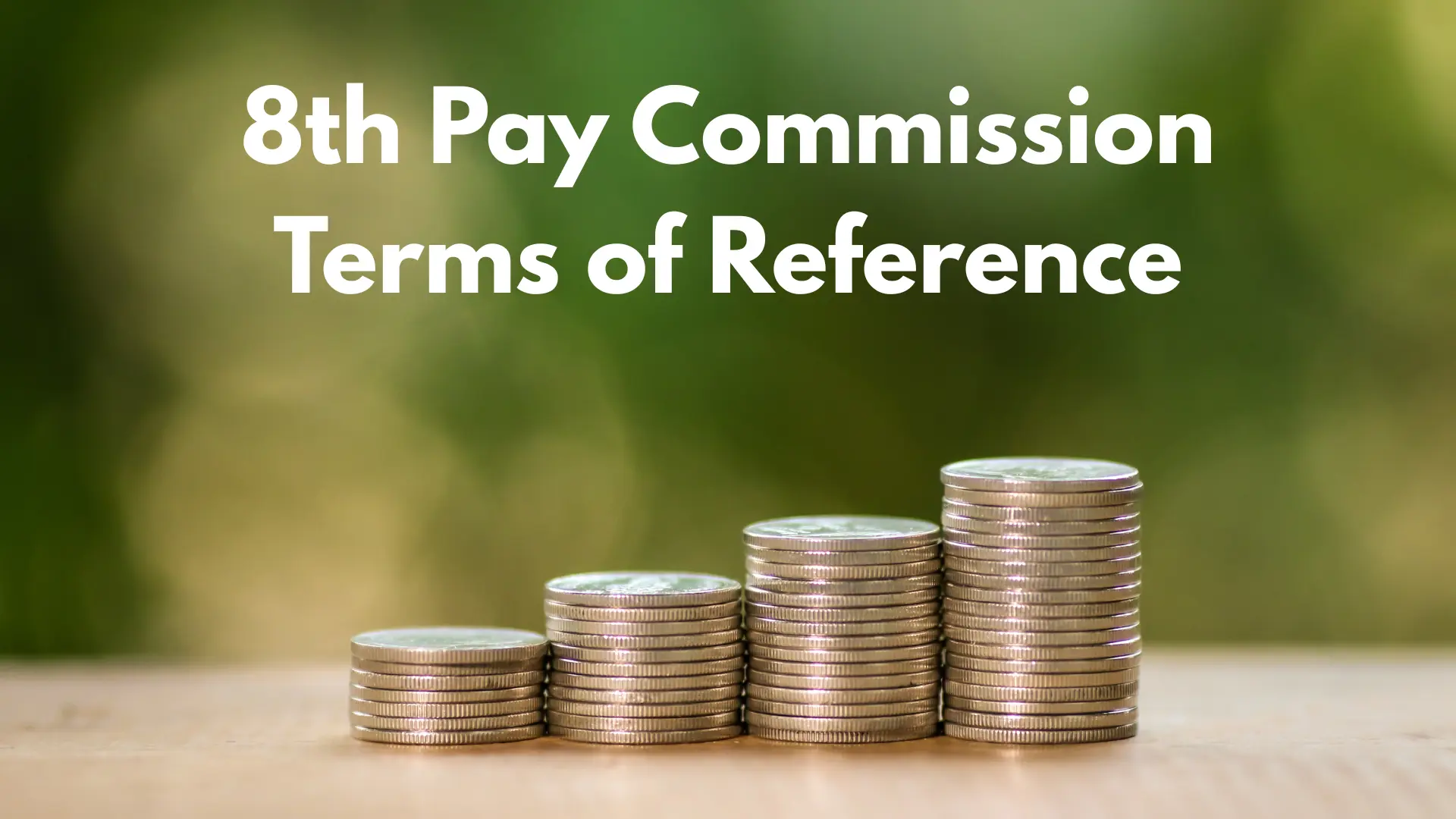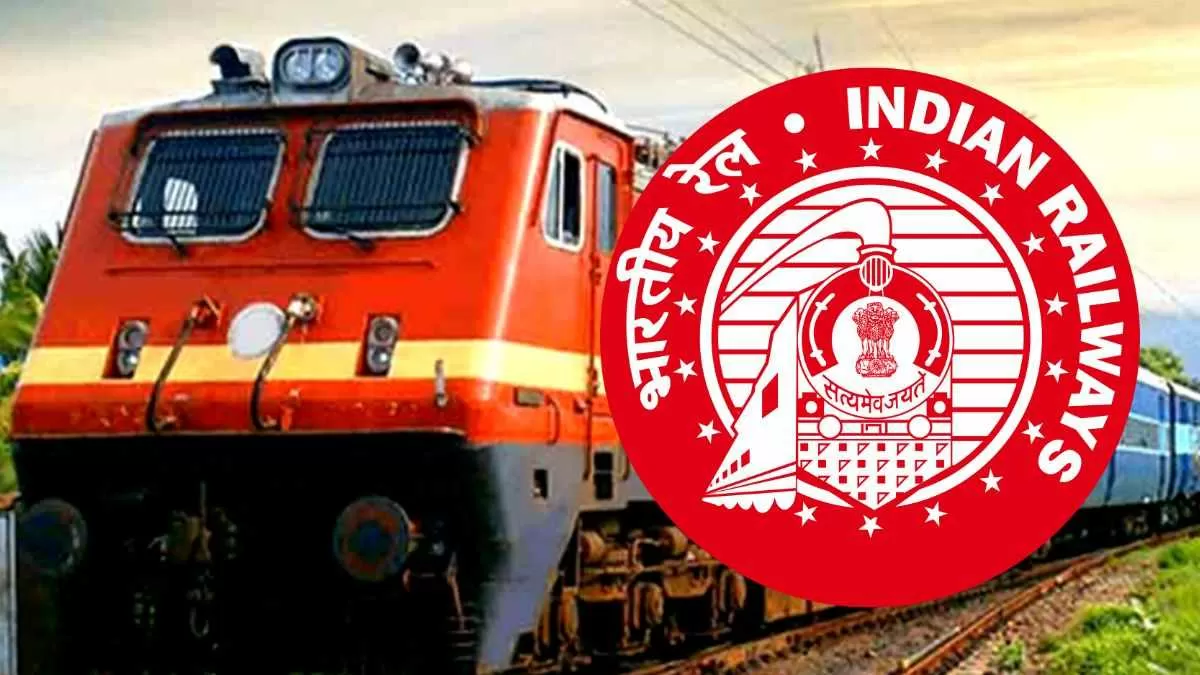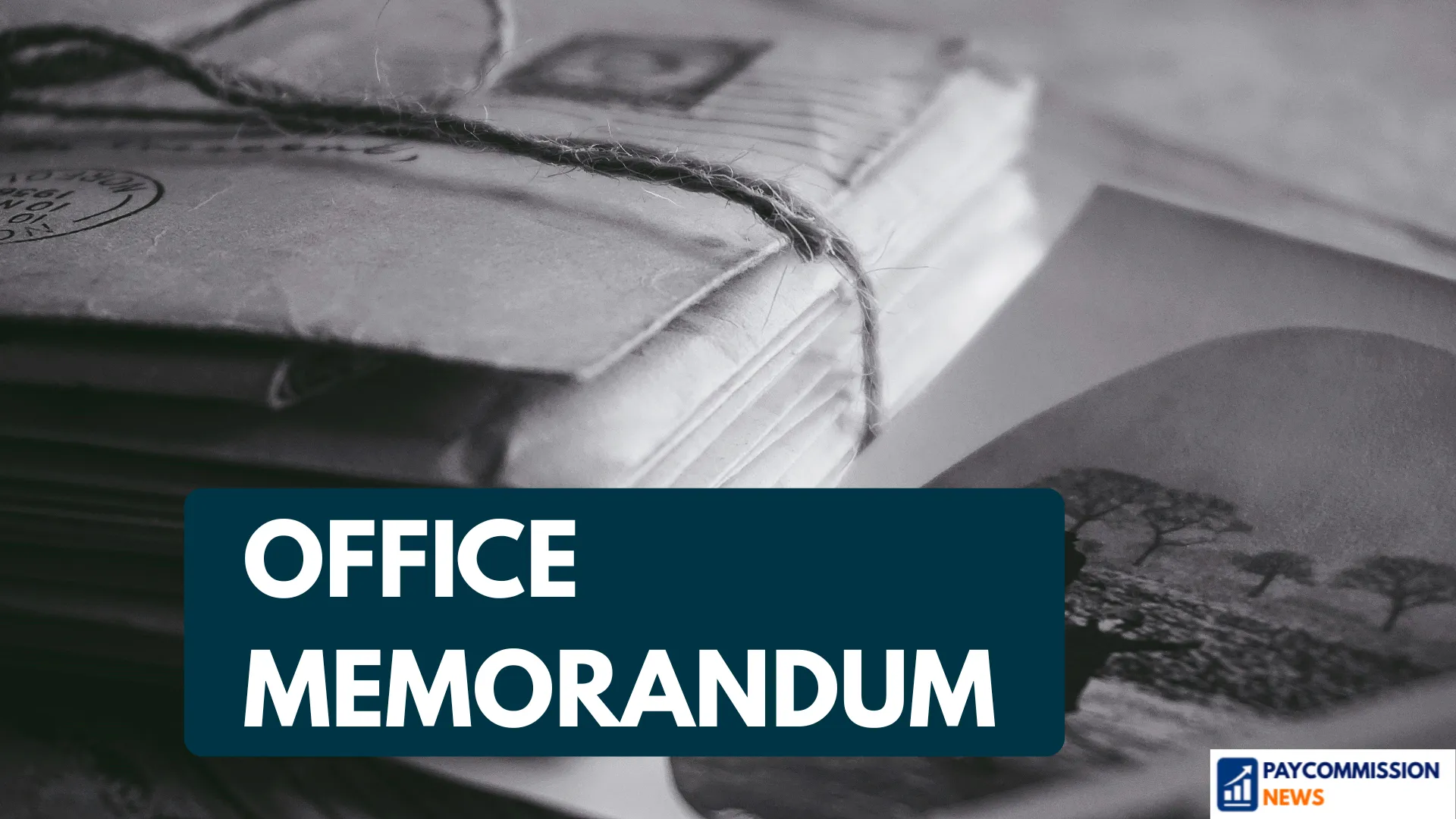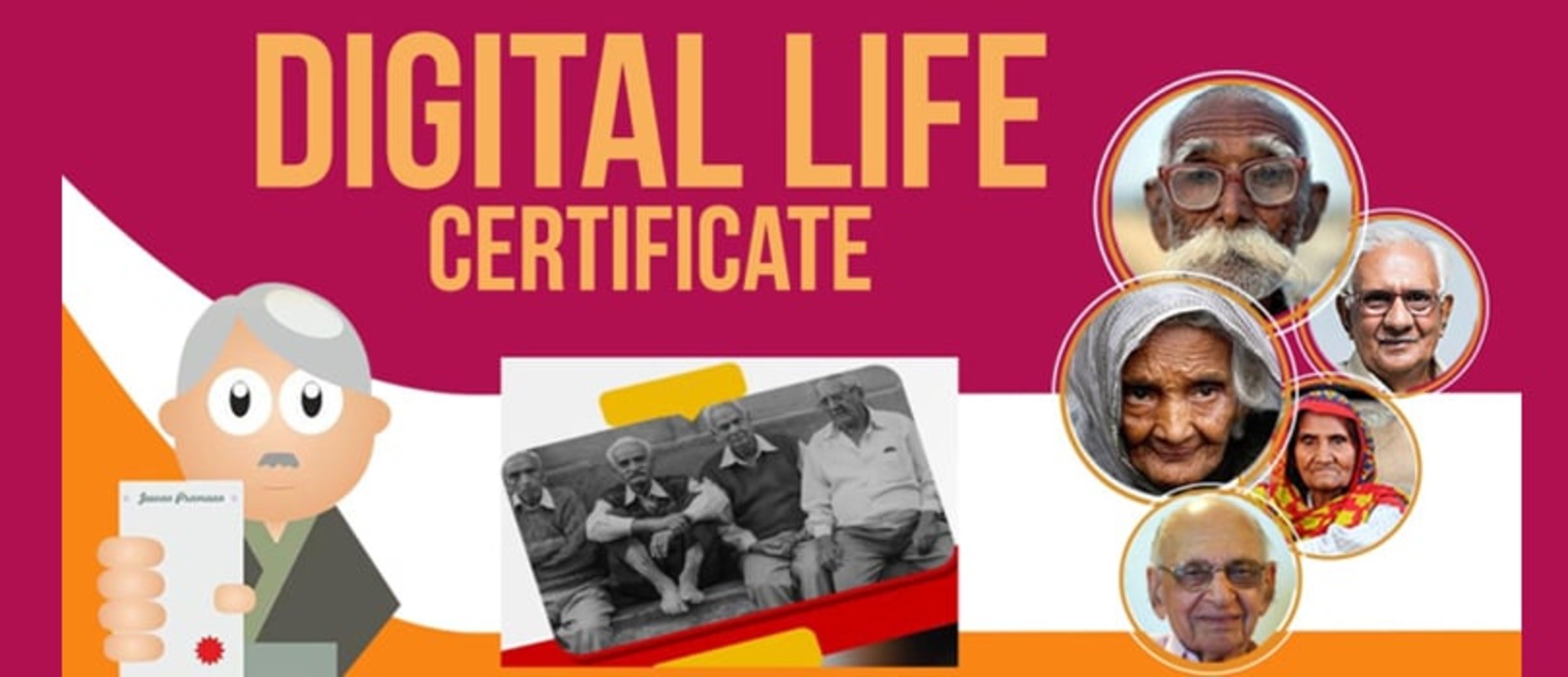GAZETTE NOTIFICATION: Government Constitutes 8th Central Pay Commission: Resolution on Constitution and Terms of Reference
New Delhi, November 4, 2025 – The Government of India, through a Resolution from the Ministry of Finance (Department of Expenditure), has officially announced the constitution of the Eighth Central Pay Commission (8th CPC). This significant move, effective from November 3, 2025, marks the beginning of a process to review and recommend changes to the emoluments and service conditions of a vast number of government employees and personnel.
Commission Leadership and Composition
The Government has appointed a three-member body to spearhead the commission’s work:
- Chairperson: Smt. Justice Ranjana Prakash Desai
- Member (Part-Time): Prof. Pulak Ghosh
- Member-Secretary: Shri Pankaj Jain
Read in Hindi: गजट अधिसूचना: सरकार द्वारा आठवें केंद्रीय वेतन आयोग का गठन: गठन और विचारार्थ विषयों (Terms of Reference) पर संकल्प
Comprehensive Terms of Reference (ToR)
The 8th CPC has been given a broad and detailed mandate, aimed at rationalizing emoluments while taking into account contemporary functional and specialized needs.
Key Areas of Examination and Recommendation:
- Emoluments Review: To examine and recommend desirable and feasible changes in pay, allowances, and other facilities/benefits (in cash or kind). This includes categories such as:
- Central Government employees (industrial and non-industrial)
- Personnel of the All India Services and Defence Forces
- Personnel of Union Territories and the Indian Audit and Accounts Department
- Officers/employees of the Supreme Court, High Courts (whose expenditure is borne by UTs), and judicial officers of subordinate courts in UTs.
- Members and staff of regulatory bodies (excluding the RBI).
- Attracting Talent: To devise an emolument structure that is conducive to attracting talent, promoting efficiency, accountability, and responsibility in the government work culture.
- Incentive Schemes: To review existing bonus schemes and recommend improvements, focusing on performance, productivity, and an appropriate incentive scheme to reward excellence.
- Allowances Rationalization: To review the multiplicity of existing allowances and their admissibility conditions, recommending their rationalization.
- Gratuity and Pension Review:
- Review the Death-cum-Retirement Gratuity for employees under the National Pension System (NPS).
- Review Gratuity and pensions for employees not under the NPS.
- Guiding Principles: The recommendations must be formulated while keeping in view crucial factors, including:
- The economic conditions of the country and the need for fiscal prudence.
- The need to ensure adequate resources for developmental and welfare measures.
- The unfunded cost of non-contributory pension schemes.
- The likely impact on State Government finances.
- Prevailing emolument structures in Central Public Sector Undertakings (CPSUs) and the private sector.
Also Read: Cabinet approves ToR of 8th Central Pay Commission: Recommendations within 18 months
Timeline and Procedure
The Commission will function with its headquarters in New Delhi and is tasked with submitting its full recommendations within 18 months from the date of its constitution (i.e., by May 2, 2027). It retains the option to submit interim reports as and when recommendations on specific matters are finalized.
The 8th CPC is fully empowered to devise its own procedure, appoint necessary Advisors, Consultants, and Experts, and call for information and evidence from Ministries, Departments, State Governments, and Service Associations, who are urged to extend their fullest cooperation.
This appointment signals the start of a major exercise that will shape the financial and non-financial benefits for millions of public servants across India for the coming years.
8th CPC TOR Gazette Notification
Resolution on Constitution and Terms of Reference
MINISTRY OF FINANCE
(Department of Expenditure)
RESOLUTION
New Delhi, the 3rd November, 2025
F. No. 01-01/2025-E.III(A).—The Government of India have decided to appoint the Eighth Central Pay Commission comprising of the following:-
Chairperson – Smt. Justice Ranjana Prakash Desai
Member (Part-Time) – Prof. Pulak Ghosh
Member-Secretary – Shri Pankaj Jain
2. The terms of reference of the Commission will be as follows:-
a) To examine and recommend changes that are desirable and feasible in the emoluments including pay, allowances, and other facilities/ benefits, in cash or kind, having regard to rationalization, contemporary functional requirements and the specialized needs of various Departments, agencies and services in respect of following categories of employees:
(i) Central Government employees — industrial and non-industrial;
(ii) Personnel belonging to the All India Services;
(iii) Personnel belonging to the Defence Forces;
(iv) Personnel of the Union Territories;
(v) Officers and employees of the Indian Audit and Accounts Department;
(vi) Members of the regulatory bodies (excluding the RBI) set up under the Acts of Parliament;
(vii) Officers and employees of the Supreme Court;
(viii) Officers and employees of the High Courts whose expenditure is borne by the Union Territories; and
(ix) Judicial officers of the subordinate courts in the Union Territories.
[Note: In respect of judicial officers, the Commission shall adhere to the principle enunciated by the Supreme Court in its Judgement dated 24th August, 1993 in All India Judges’ Association and Others V/s Union of India and Others, viz. that there shall be no link between service conditions of judges and administrative executive and that the service conditions of judges have to meet the special needs of the judiciary].
(b) To work out an emolument structure conducive to attracting talent to Government service, promoting efficiency, accountability and responsibility in the work culture.
(c) To examine the existing schemes of bonus with a view to improving performance and productivity and make recommendations on the general principles, financial parameters, productivity and performance linked parameters for an appropriate incentive Scheme to reward excellence in productivity and performance.
(d) To review the existing allowances and conditions of their admissibility and recommend their rationalization keeping in view the multiplicity of allowances.
(e)
(i) To review the Death-cum-Retirement Gratuity of employees borne on the National Pension System (including Unified Pension Scheme) and make recommendations thereon.
(ii) To review the Death-cum-Retirement Gratuity and pensions of employees not borne on the National Pension System (including Unified Pension Scheme) and make recommendations thereon keeping in view Para f(iii) below.
(f) To make recommendations on the above, keeping in view:
(i) The economic conditions in the country and the need for fiscal prudence;
(ii) The need to ensure that adequate resources are available for developmental expenditure and welfare measures;
(iii) The unfunded cost of non-contributory pension schemes;
(iv) The likely impact of the recommendations on the finances of the State Governments which
usually adopt the recommendations with some modifications; and
(v) The prevailing emolument structure, benefits and working conditions available to employees of Central Public Sector Undertakings and private sector.
3. The Commission will devise its own procedure and may appoint such Advisors, Institutional Consultants and Experts, as it may consider necessary for any particular purpose. It may call for such information and take such evidence, as it may consider necessary. Ministries and Departments of Government of India shall furnish such information and documents and other assistance as may be required by the Commission. The Government of India trusts that State Governments, Service Associations and others concerned will extend to the Commission their fullest cooperation and assistance.
4. The Commission will have its headquarters in Delhi.
5. The Commission will make its recommendations within 18 months of the date of its constitution. It may consider, if necessary, sending interim reports on any of the matters as and when the recommendations are finalized.
V. VUALNAM, Secy.
ORDER
ORDERED that the Resolution be published in the Gazette of India.
ORDERED also that a copy of the Resolution be communicated to the Ministries/Departments of the Government of India, State Governments/ Administrations of Union Territories and all others concerned.
V. VUALNAM, Secy.
Click here to download Gazette Notification






